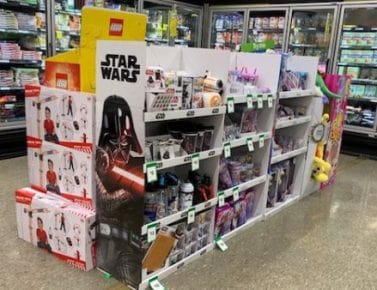The Covid-19 pandemic has highlighted the importance of a local supply chain, and during this time the FMCG industry has also realised the value in local packaging manufacturers.
Fears over contamination and freight delays prompted many brands to rethink overseas partnerships and source displays closer to home.
Abbe, a packaging and cardboard manufacturer based in Victoria, is one business which has seen an influx of clients in response to the outbreak.
The website alone has seen a 40-per-cent increase in traffic across the Displays category over the last six months, compared to the same period last year.
Rob Sulfaro, BDM, POS Displays at Abbe, says brands go to countries like China for competitive pricing, but realise the importance of local when things go wrong.
“We certainly have seen quite a significant growth in recent months due to Covid-19 and brands seeking local manufacturers,” Sulfaro says.
“At the start of the pandemic, some big brands abandoned offshore projects because of concerns about the virus. I received 27 briefs in one day from one major client and have received many more from others since then.”
Working with overseas suppliers can be time consuming, with prototypes often having to be sent back and forth until the brand gets the right result, and that’s before considering international freight delays as a result of Covid-19.
As case numbers continue to mount at home and abroad, Sulfaro expects the trend towards domestic manufacturing to continue.
Beyond the return to local, Sulfaro has noticed a number of other trends emerge in this category in recent times.
“One of the big things that stands out right now for brands is the top-up shopper.
“Three years ago, people did a weekly shop on a Sunday night, but now people are going into supermarkets and retail three or four days a week.”
The rise of the top-up shopper has also fuelled the growth in petrol and convenience, with major fuel-retail collaborations such as David Jones x BP, Woolworths x Caltex and APCO x IGA hitting the market.
“Brands are allocating more money to petrol and convenience – that’s what I’m seeing as a trend right now in retail,” he says.
With the increase in convenience shopping, the opportunities for impulse purchases are on the rise.
“That impulse buy is on the increase, it’s really important. That’s why there’s a lot of money being spent on POS displays,” Sulfaro says.
And while the Covid-19 pandemic has driven an increase in online shopping, Sulfaro is not worried that it will have a negative impact on the business.
“Online and in-store presence go hand in hand. They work for each other.
“Over the last five or six years more people have been buying online, but they’re still going to shopping centres, even if just to browse or try on clothes. So, it’s about building that presence and being top of mind when someone walks past a store or through an aisle.”
Sustainability is another key trend in packaging and displays, and something that has helped drive growth at Abbe, particularly over the last six to 12 months.
“We’re seeing a lot of brands investing in visual merchandising, like window displays, and replacing plastic with cardboard for these,” Sulfaro says.
“A lot of displays that come in from overseas have plastic clips on the side, which need to be removed from the stand before they are recycled, but clients are moving away from that as it’s not sustainable.”
As a manufacturer of cardboard products, this side of the business continues to do well, and with the exponential growth in e-commerce, demand is high for cardboard delivery boxes.
Abbe is now launching a range of 28 retailer-friendly POS displays including stands, dump bins, hang sells and counter units, that have already been designed in a variety of sizes and profiles. These existing designs can be produced from concept and design, manufacturing of board, printing, and conversion through to delivery in a matter of weeks.
“Brands don’t need to go offshore anymore. We’re just trying to be different and create a better experience for our customers.”
—-Abbe is a family-owned business that has been operating for 30 years. It is now operated by Anthony, Daniel and Chris O’Sullivan—-
Source: Inside FMCG




